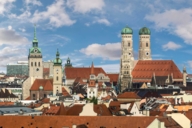
Munich combines history, culture, joie de vivre and nature in a truly unique way. Bavaria's capital, with around 1.6 million residents, is considered one of the most livable cities in Europe. Between historic façades, modern museums and green parks, it's easy to feel why Munich is so beloved: here, tradition meets innovation, calm meets energy, and big-city flair meets Bavarian gemütlichkeit.
- Munich on the map: Where is Munich located?
- History of Munich
- Patron Saints & Symbols
- What is Munich known for?
- Typical Munich – Lifestyle & Dialect
- Munich’s Neighborhoods
- Sights & Highlights: What should you see in Munich?
- Which museums and art venues are especially worth visiting?
- Why is beer so important in Munich?
- Bavarian Cuisine & Culinary Delights
- Sports City Munich: FC Bayern & Olympiapark
- Which parks and green spaces does Munich offer?
- Mobility & Getting Here
Munich is located in southern Germany, in the heart of Bavaria, and serves as both the economic and cultural center of the region.
The city is easy to reach by train, car or plane and is the perfect starting point for excursions to the Alps, Lake Starnberg or Lake Ammersee.
Tip: A city map of Munich is available for download – including neighborhoods, sights and useful orientation for visitors.
Munich’s story begins in 1158, when Duke Henry the Lion introduced customs duties at a bridge over the River Isar. The settlement was known as “near the monks”, which eventually gave the city its name.
In 1268, the Wittelsbach dynasty took over and shaped Munich for centuries as their residence city. Under their rule, magnificent buildings such as the Munich Residenz (city palace), Schloss Nymphenburg (Nymphenburg Palace) and the Theatinerkirche (church) were created.
During the 19th century, Munich became a center of art and science.
King Ludwig I and later King Ludwig II transformed the city into a thriving cultural metropolis.
After severe destruction during World War II, Munich was lovingly rebuilt and has since developed into a modern, green and forward-looking city.
Today, Munich stands for a harmonious blend of history and modernity, tradition and progress.
Munich's patron saint is the Virgin Mary, whose golden statue stands atop the Mariensäule (Mary's Column) on Marienplatz.
The famous Münchner Kindl on the city's coat of arms recalls Munich’s monastic origins and continues to symbolize openness, joy of life and community.
Munich is famous for art, culture, beer, football and its unique lifestyle.
Worldwide icons include the Oktoberfest, the Englischer Garten, FC Bayern Munich, the Hofbräuhaus and the city's beer gardens.
But Munich also stands for design, technology and sustainability – home to innovation, fashion and research.
What’s typical for Munich is the mix of comfort and cosmopolitan spirit.
This is where dirndls meet design, wheat beer meets espresso, and laptops meet lederhosen.
The Munich dialect – charming and melodic – belongs to the city just like the pretzel to the beer. Greetings such as “Servus” and “Griaß di” create a warm local welcome.
The Munich lifestyle means enjoying life without rushing – live and let live.
Munich is a city of neighborhoods – each with its own character and charm:
Munich offers countless memorable sights:
As one of Europe's leading cultural cities, Munich offers more than 60 museums:
Beer in Munich is part of everyday culture. The Bavarian Beer Purity Law of 1516 originated here and is still followed by Munich's six major breweries: Augustiner, Paulaner, Hacker-Pschorr, Spaten, Löwenbräu and Hofbräu.
The Hofbräuhaus is Munich's most famous beer hall – welcoming locals and visitors since 1589.
In beer gardens beneath chestnut trees, Munich's true spirit unfolds: open, relaxed and convivial.
From Weißwurst and roast pork to Kaiserschmarrn – Munich is a stronghold of Bavarian cuisine.
Traditional inns, taverns and modern restaurants blend heritage with innovation, with regional ingredients playing an important role.
FC Bayern Munich is world-famous – a symbol of passion, success and teamwork.
The Allianz Arena, with its illuminated façade, is one of Europe's most modern stadiums and an architectural landmark.
Built for the 1972 Olympic Games, the Olympiapark stands for openness, progress and iconic design. Its tent roofs still shape Munich's skyline. Today, the area hosts concerts, sports and recreational activities.
Munich is one of Europe's greenest major cities.
The Englischer Garten – larger than Central Park – invites visitors to stroll, cycle or surf the Eisbachwelle (river wave).
Other green oases include the Westpark, Schloss Nymphenburg Park, Hirschgarten, Luitpoldpark, the Botanischer Garten München-Nymphenburg (Munich Botanical Garden) and the Isar riverbanks.
In less than an hour, you can reach the Alps or Bavarian lakes – perfect for hikes, swimming trips or skiing.
Whether on foot, by bike, subway or e-scooter – getting around Munich is effortless.
The MVV public transport network is one of Europe's best.
Munich Airport has won multiple awards as Europe's top airport, and Munich Hauptbahnhof (Central Station) offers direct connections to Vienna, Zurich and Berlin.